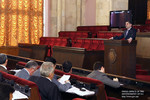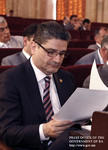Tuesday, 8 June 2010
Prime Minister Tigran Sargsyan’s statement in National Assembly on 2009 RA State budget performance report
The 2009 State budget performance report was discussed in all detail during the joint sitting of parliamentary commissions. Now, I would like to clear up the rationale behind the government’s anti-crisis program which is broken down in figures in the report at issue.
Firstly, it should be noted that our financial and economic systems, as well as the welfare network met with serious threats last year. Amid the stated 14.2% downturn, Armenia’s financial, economic and welfare systems demonstrated quite a high level of resistance allowing us to achieve the targets set in the sphere of social protection.
Secondly, they were aimed at nurturing economic growth and generating new jobs. As the global crisis had reduced the level of private investments, the government had to apply a complex system of economic incentives. We realized that cutbacks in spending items would be inexpedient amid still standing crisis and low budget receipts. Therefore, we had to contract additional debts. The foreign debt/GDP ratio was taken up to some 36% from 13% as stated early last year, stretching the budgetary gap wider apart to a decade-high level of about 7.4%. Embracing an expansionary policy line, the State had to decide on spending areas. It was obvious that infrastructures, inclusive of road building, irrigation and drinking water supply, should be a primary focus, with a special emphasis placed on improved agriculture and business environment. This was the first component of our anti-crisis program which was given the bulk of borrowed funds. Along with new drinking water systems, we were able to build 411km-long road sections setting up a record.
Improvement of the home business environment was the second fundamental area of activity. In the first place, better conditions were provided for small and medium-size enterprises which, on the one hand, were granted a fiscal resource and, on the other hand, were offered improved legislation: the tax burden was eased thanks to simplified rules and procedures. As a result, our economy gained in resistance. The third area was a system-building one with the support of those enterprises facing temporary hardships due to world markets’ adverse pricing trends.
Prompt financial support to that effect was made available preventing thousands of jobs from being cancelled in larger enterprises. In this way, we were able to mitigate social tensions in large enterprises, with the treasury succeeding to recover the whole amount of those funds so allocated. Either this is an evidence of our efforts’ efficiency. You may understand that these expansionary measures were sure to have an impact on our economy which was the case in the second half of 2009. Downturn slid off the mark of 18.3% to reach 14.2% by yearend. In 2010, these measures started taking effect, and we recorded a 7.2% rise over the first 4 months of this year.
We are sure that overall performance will be higher than our forecast of early 2010. A fundamental idea was placed behind our anti-crisis action, namely that the State should meet its social commitments in full. Furthermore, we managed an increase in pensions in 2009 with a 16% buildup of the pension fund. Welfare benefits went up, too, helping to soften the negative impact of the global crisis.
At the same time, the crisis was an opportunity to expose our economy’s assets and weaknesses by drawing lessons for the future. The first important lesson is that our economy suffers from inadequate diversity which caused it to display the highest rate of downturn as compared to other countries.
In general, the global crisis demonstrated that those countries boasting higher level of economic diversification chiefly consisting of developed countries suffered less from the crisis than the ones with poor economic diversity. We must diversify our economy and, of course, free it from its high level of construction-dependency. You may understand that the recorded overwhelming fall in construction was a serious blow to the GDP, so we will have to achieve greater diversification in economy as soon as possible.
Competitiveness and competitive environment is the second major task to tackle as once addressed it will help attract private investments and find out new spheres of economic activity. Much is to be done in this area. We will have to push further ahead with the ongoing tax and customs reform and, on the other hand, better the competitive environment.
The exposure of our export potential is the third lesson to draw from the situation at hand. We must encourage job-intensive exports. The project of Zvartnots airport’s free economic zone, the launch of State-participated export-oriented enterprises and the introduction of new farming mechanisms will help us detect new export potentialities.
The fourth lesson is that we must step up reform if we are to modernize our economic system. The first five months of this year showed that the strategy embraced has come to take effect. Now, I would like to state those reforms as seem to be of highest priority. As you know, the National Assembly has ratified a legislative package on mandatory insurance. Starting next January, the third- party risk insurance requirement will be applicable in the Republic of Armenia to shape quite a new financial environment in the country. Pension reform will help introduce innovational mechanisms in all spheres of activity aimed at enhancing citizen responsibility for the future of their social and economic problems. The concept of free economic zone will boost exports.
The institute of mandatory audit will promote economic field transparency for large enterprises in 2010 facilitating the use of a risk-based operational scheme by the State Revenue Committee. The anticipated use of one-stop-shops in public services as of this year will go a long way toward bettering Armenia’s business environment and simplifying business registration processes. In general, it should be noted that our business condition improvement-targeted efforts proved successful in 2009, since our business-doing rating went up by 7 points last year. Work should be continued in this direction.
From the perspective of strategic reforms, real-sector projects are important, too. They include a new NPP unit, the north-south road corridor, the north-south railroad, Meghri HPP, Yerevan Physics Iinstitute-based new center of oncology, Tatev complex rehabilitation work etc. All those actions incorporated in the government program are supposed to help address the problems faced in 2009.
My colleagues will follow me to provide detailed figures of FY2009 budget performance. Ending up my statement, I would like to thank National Assembly members for cooperation. Many anti-crisis actions would not have been realized without your approval of key legislative acts which on the one hand improved the business environment and, on the other hand, defined clear-cut mechanisms for effective and growth-oriented use of State support. I feel that together we can state further success in 2010.
Thank you.











